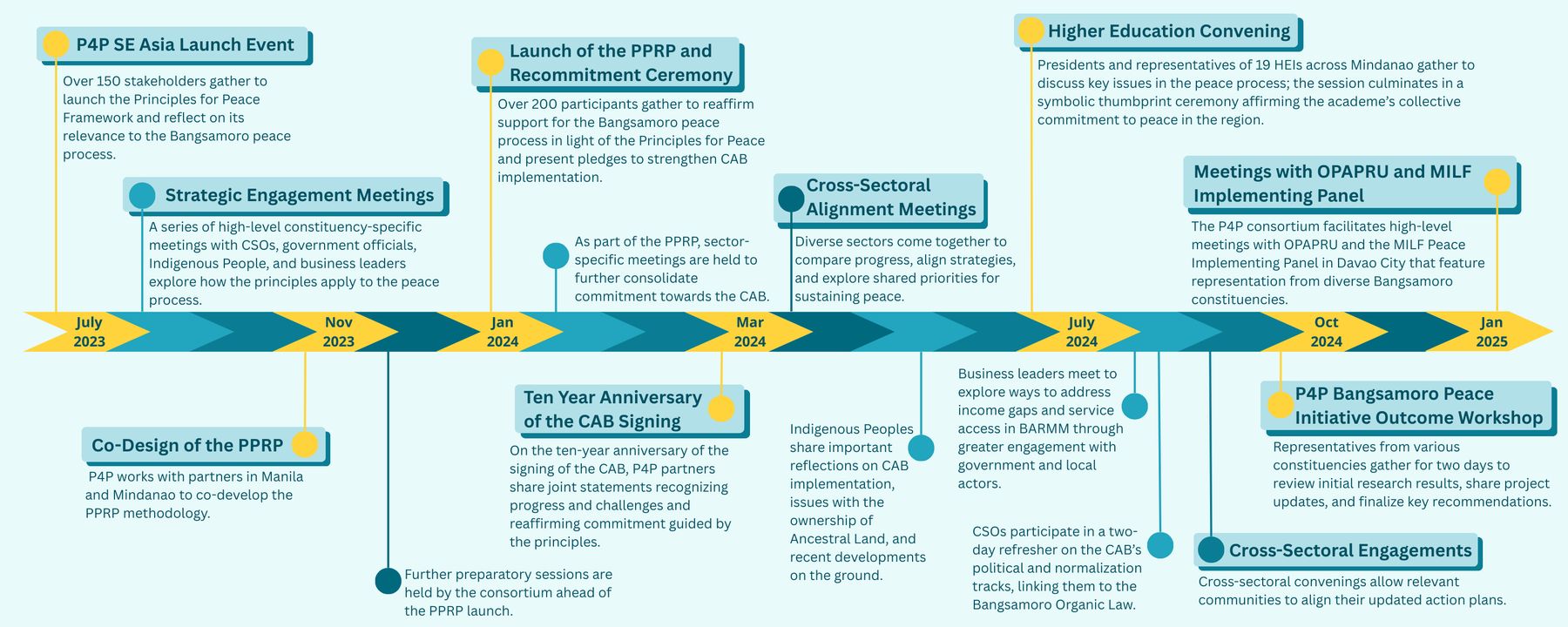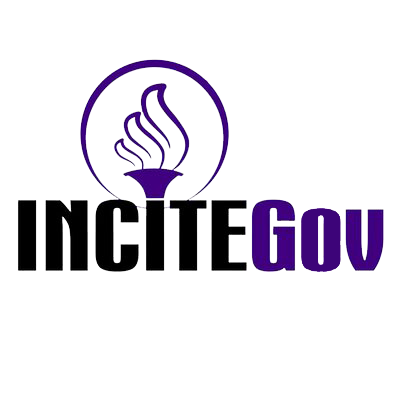Accompaniment
overview
The Participatory Periodic Review Process (PPRP), a flagship methodology of the P4P toolkit, was implemented in the Bangsamoro Autonomous Region in Muslim Mindanao (BARMM) from 2023 to 2025. Inspired by the Universal Periodic Review mechanism in the human rights field, the PPRP represents an innovative approach to tracking and strengthening peace, one that centres the voices, perspectives, and lived experiences of communities most affected by conflict.
Through this strategic accompaniment initiative, P4P initiated a locally led process aimed at re-energizing the Bangsamoro peace process and reinforcing inclusive and accountable peacebuilding. The initiative supported a consortium of Filipino civil society organizations in reinvigorating the peace architecture and shaping national dialogue on the future of the region.

context
Since 1969, the Bangsamoro region in the Philippines has experienced decades of armed conflict, as groups representing the Muslim population in Mindanao—such as the Moro National Liberation Front (MNLF) and the Moro Islamic Liberation Front (MILF)—struggled for autonomy. After decades of hostilities, the signing of the Comprehensive Agreement on the Bangsamoro (CAB) in 2014 marked a historic step toward peace, ending a conflict that claimed over 150,000 lives.
The CAB process underscored the importance of inclusion and pluralism, with notable contributions from women mediators and civil society. Several stakeholders involved in the CAB’s negotiation also contributed to the development of the Principles for Peace, reflecting a shared vision from the outset.
Despite this progress, the full implementation of the CAB continues to face major challenges. Unfulfilled commitments from both signatories have contributed to rising tensions and persistent violence. The 2018 referendum that led to the creation of BARMM offered a renewed opportunity—but with the 2025 local elections approaching and uncertainties surrounding the region’s transition, the need to re-energize the peace process became increasingly urgent.
P4P’s engagement began at this critical inflection point, bringing both methodological innovation and strategic support to local actors working to safeguard and advance peace.
activities
Strategic Engagement and Co-Design
The South East Asia Launch of the Principles for Peace Framework in Davao in July 2023 marked the beginning of a dynamic, locally driven process.
Following the launch, P4P initiated a co-design process with partners to shape the PPRP as a dynamic, participatory mechanism to assess the state of peace, identify risks, and propose corrective actions. Grounded in the Principles for Peace, the PPRP created inclusive and trusted spaces where communities could collectively review peace progress, voice concerns, and co-define advocacy strategies.
P4P partnered with a local consortium—the Initiative for International Dialogue (IID), InciteGov, and the Gaston Z. Ortigas Peace Institute—to implement the process.
Together, they convened:

14 sectoral consultations

5 cross-sectoral meetings

5 high-level engagements
with the national government
and MILF leadership
These spaces brought together diverse voices, including:
- Mindanao-based civil society
- National/Metro Manila-based civil society
- Indigenous Peoples
- Religious leaders
- Academia
- Business and private sector
- Women’s organizations
- Youth representatives
Efforts were made to ensure the inclusion of underrepresented voices from remote and conflict-affected areas such as Sulu, Basilan, and Tawi-Tawi, ensuring the process was anchored in inclusivity and local legitimacy.
key achievements
The PPRP initiative was recognized by both CAB signatories and the broader Bangsamoro constituency as credible, politically relevant, and community-anchored mechanism to safeguard the peace process. Key achievements include:
- Fostering trust across sectors: Sustained engagement from diverse actors built mutual trust among historically siloed groups and amplified the voices of marginalized and remote communities.
- Joint advocacy outcomes: Cross-sectoral collaboration led to impactful initiatives such as the development of the Non-Moro Indigenous Peoples Code and a trilateral harmonization workshop to support its implementation.
- Constituency ownership: Partners initiated independent activities such as university-led voter education campaigns and direct engagement with government stakeholders.
- High-level recognition and validation: The process gained the trust of both MILF and government officials, enabling meaningful dialogue on sensitive issues and affirming the role of local actors as legitimate peace interlocutors.
For example, high-level engagements included a dialogue with the MILF Peace Implementing Panel in Davao City, led by Minister Mohagher Iqbal, and meetings with OPAPRU officials, including Secretary Carlito Galvez Jr. These exchanges allowed representatives from Indigenous communities, religious groups, youth, women, business, and academia to raise concerns, build mutual understanding, and propose paths forward.
The methodology of this process was co-developed and continuously adapted with local partners to reflect the specific needs of the Bangsamoro context. The process included:
- Continuous data collection on the peace process
- Participatory assessments of of peace and transition progress
- Joint development of advocacy priorities
- Collaborative engagements with institutional stakeholders
Following an initial period of socialization and co-design, ceremony the process culminated in a high-level Recommitment Ceremony in January 2024 at the Grand Hyatt Manila.
At this milestone event, representatives from different constituencies reaffirmed their dedication to the peace process and made concrete pledges:
- Religious leaders committed to becoming a trusted channel for peace messaging and reviving the Bishop-Ulama Conference.
- Women’s groups pledged to address peace gaps through intergenerational, intersectional political engagement.
- Youth, academia, civil society, and business sectors also presented commitments to promote accountability and inclusion.
looking ahead
While the PPRP laid the foundation for more inclusive and collaborative peacebuilding, the Bangsamoro peace process remains fragile. Horizontal violence, uncertainties around the upcoming BARMM elections, and unfulfilled commitments—especially in the normalization track—underscore the need for continued vigilance and engagement.
That the PPRP is now locally led and self-sustaining stands as proof of its relevance, durability, and transformative potential. The Bangsamoro experience offers compelling evidence that strategically facilitated, community-anchored review mechanisms can serve as powerful tools for mid-course correction, accountability, and legitimacy in complex peace processes.
The PPRP is now locally led and sustained, demonstrating the power of community-owned processes and proving its relevance, durability, and transformative potential. Going forward, the Bangsamoro experience offers compelling evidence that strategically facilitated, community-anchored review mechanisms can serve as powerful tools for mid-course correction, accountability, and legitimacy in complex peace processes.
P4P remains committed to supporting local leadership, scaling this methodology where needed, and embedding it within broader global peace architectures to enable smarter, more inclusive, and more resilient peacebuilding efforts worldwide.




